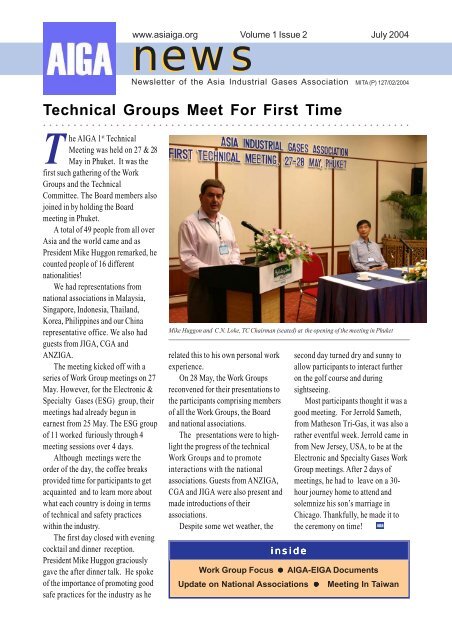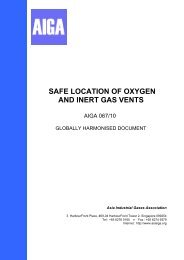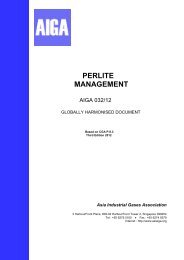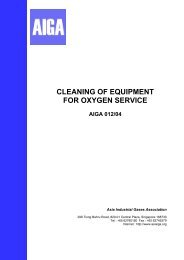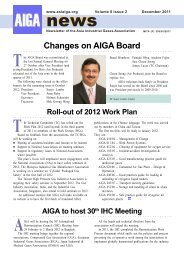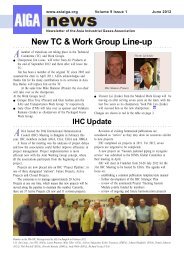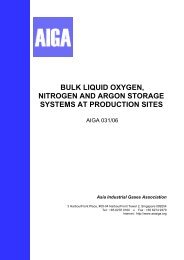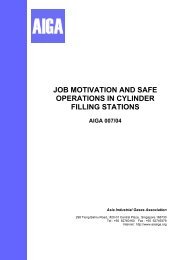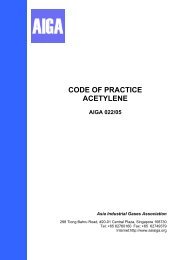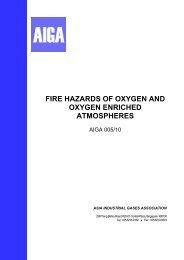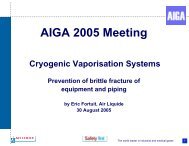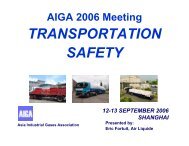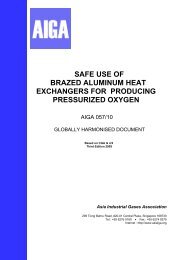Technical Groups Meet For First Time T - AIGA
Technical Groups Meet For First Time T - AIGA
Technical Groups Meet For First Time T - AIGA
You also want an ePaper? Increase the reach of your titles
YUMPU automatically turns print PDFs into web optimized ePapers that Google loves.
www.asiaiga.org Volume 1 Issue 2<br />
news<br />
July 2004<br />
Newsletter of the Asia Industrial Gases Association MITA (P) 127/02/2004<br />
<strong>Technical</strong> <strong>Groups</strong> <strong>Meet</strong> <strong>For</strong> <strong>First</strong> <strong>Time</strong><br />
T○ ○ ○ ○ ○ ○ ○ ○ ○ ○ ○ ○ ○ ○ ○ ○ ○ ○ ○ ○ ○ ○ ○ ○ ○ ○ ○ ○ ○ ○ ○ ○ ○ ○ ○ ○ ○ ○ ○ ○ ○ ○ ○ ○ ○ ○ ○ ○ ○ ○ ○ ○ ○ ○ ○ ○ ○ ○ ○ ○ ○<br />
he <strong>AIGA</strong> 1 st <strong>Technical</strong><br />
<strong>Meet</strong>ing was held on 27 & 28<br />
May in Phuket. It was the<br />
first such gathering of the Work<br />
<strong>Groups</strong> and the <strong>Technical</strong><br />
Committee. The Board members also<br />
joined in by holding the Board<br />
meeting in Phuket.<br />
A total of 49 people from all over<br />
Asia and the world came and as<br />
President Mike Huggon remarked, he<br />
counted people of 16 different<br />
nationalities!<br />
We had representations from<br />
national associations in Malaysia,<br />
Singapore, Indonesia, Thailand,<br />
Korea, Philippines and our China<br />
representative office. We also had<br />
guests from JIGA, CGA and<br />
ANZIGA.<br />
The meeting kicked off with a<br />
series of Work Group meetings on 27<br />
May. However, for the Electronic &<br />
Specialty Gases (ESG) group, their<br />
meetings had already begun in<br />
earnest from 25 May. The ESG group<br />
of 11 worked furiously through 4<br />
meeting sessions over 4 days.<br />
Although meetings were the<br />
order of the day, the coffee breaks<br />
provided time for participants to get<br />
acquainted and to learn more about<br />
what each country is doing in terms<br />
of technical and safety practices<br />
within the industry.<br />
The first day closed with evening<br />
cocktail and dinner reception.<br />
President Mike Huggon graciously<br />
gave the after dinner talk. He spoke<br />
of the importance of promoting good<br />
safe practices for the industry as he<br />
Mike Huggon and C.N. Loke, TC Chairman (seated) at the opening of the meeting in Phuket<br />
related this to his own personal work<br />
experience.<br />
On 28 May, the Work <strong>Groups</strong><br />
reconvened for their presentations to<br />
the participants comprising members<br />
of all the Work <strong>Groups</strong>, the Board<br />
and national associations.<br />
The presentations were to highlight<br />
the progress of the technical<br />
Work <strong>Groups</strong> and to promote<br />
interactions with the national<br />
associations. Guests from ANZIGA,<br />
CGA and JIGA were also present and<br />
made introductions of their<br />
associations.<br />
Despite some wet weather, the<br />
inside<br />
inside<br />
second day turned dry and sunny to<br />
allow participants to interact further<br />
on the golf course and during<br />
sightseeing.<br />
Most participants thought it was a<br />
good meeting. <strong>For</strong> Jerrold Sameth,<br />
from Matheson Tri-Gas, it was also a<br />
rather eventful week. Jerrold came in<br />
from New Jersey, USA, to be at the<br />
Electronic and Specialty Gases Work<br />
Group meetings. After 2 days of<br />
meetings, he had to leave on a 30hour<br />
journey home to attend and<br />
solemnize his son’s marriage in<br />
Chicago. Thankfully, he made it to<br />
the ceremony on time!<br />
Work Group Focus ����� <strong>AIGA</strong>-EIGA Documents<br />
Update on National Associations � � � � � <strong>Meet</strong>ing In Taiwan
Work Group Focus<br />
○ ○ ○ ○ ○ ○ ○ ○ ○ ○ ○ ○ ○ ○ ○ ○ ○ ○ ○ ○ ○ ○ ○ ○ ○ ○ ○ ○ ○ ○ ○ ○ ○ ○ ○ ○ ○ ○ ○ ○ ○ ○ ○ ○ ○ ○ ○ ○ ○ ○ ○ ○ ○ ○ ○ ○ ○<br />
○ O○ ○ ○<br />
Medical Medical Gas Gas Work Group<br />
ne of the objectives of the 1 st <strong>Technical</strong> <strong>Meet</strong>ing<br />
was to spur our Work <strong>Groups</strong> on to achieve their first<br />
deliverables by the time they got to Phuket.<br />
The objective was achieved. All Work groups were able<br />
to get close to finishing their work.<br />
Here are some highlights:<br />
Electronic Electronic & & Specialty Specialty Specialty Gases Gases (ESG)<br />
(ESG)<br />
Work Group<br />
The task forces came up with recommendations in the four<br />
areas of study.<br />
� Security – They proposed the adoption of EIGA 907/02<br />
(pending EIGA’s approval). In addition, the new CGA<br />
documents P50 and P51 when issued will be cited as<br />
references.<br />
� Safe handling of electronic gases – They recommended<br />
references to CGA documents P1 – Handling of<br />
Compressed Gases in Containers and P 32 – Safe Storage<br />
and Handling of Silane and Silane Mixtures.<br />
The main focus of the task force is to issue a new document<br />
under <strong>AIGA</strong> related to Safe Handling of Electronic Gases.<br />
The first draft is now complete and they expect this to be<br />
ready for approval by the <strong>Technical</strong> Committee by 3 rd quarter<br />
2004.<br />
� Emergency response for distribution activities – They<br />
have recommended the adoption of EIGA document 80/<br />
01 on Handling Emergency in Gas Containers (subject to<br />
EIGA approval).<br />
� Mutual Aid - CGA has agreed that the COMPGEAP<br />
(Compressed Gas Emergency Action Plan)<br />
manual could be used to develop a similar mutual aid<br />
framework for Asia. The task team will be putting<br />
together the basic framework and will recommend that<br />
this be initially set up for <strong>AIGA</strong> members in China.<br />
Labelling Labelling Group<br />
They have completed the first draft of a simplified and<br />
user friendly guideline on labelling for the commonly used<br />
industrial gases. Mixtures are not covered.<br />
The basis of the document will be in line with the EIGA<br />
906/02 and the UN Globally Harmonised System (GHS).<br />
The completed draft will be submitted to the <strong>Technical</strong><br />
Committee after the Phuket meeting.<br />
The group is using the EIGA document 99/03 Good<br />
Manufacturing Practice for Medicinal Gases as a basis to<br />
develop documents.<br />
The group has decided on a slightly different approach<br />
from the other groups. They think it is important to obtain the<br />
feedback from the national associations during the process of<br />
developing a document. As a result of this, they have<br />
requested that the TC approve the working draft to be<br />
circulated to the national associations first. They will obtain<br />
their feedback and will make the necessary changes before<br />
preparing it for the final <strong>AIGA</strong> approval.<br />
They started off by drafting a gas cylinder valve<br />
document as well as a document on <strong>AIGA</strong> policy (on GMP)<br />
and implementation.<br />
The group believes that the medical gases policy should<br />
be put in place first as it is critical to ensure a clear<br />
understanding of the whole process of implementing a GMP.<br />
The Work Group is considered permanent as it will take a<br />
number of years before a reasonable GMP can be developed<br />
across Asia.<br />
Currently, the first document on medical gas cylinder<br />
valves is on restricted circulation to the national associations<br />
for comments.<br />
The next set of document they will be working on is in<br />
the area of cylinder filling batch record.<br />
Gas Gas Connections Connections Work Group<br />
The group will be putting the finish touches on the first<br />
recommendations on liquid connections for the 160-litre<br />
portable liquid gas containers (LGC).<br />
Besides this, they are also completing their final<br />
recommendations on the standardization of connections for<br />
stationary storage vessels and tank trucks. They expect to<br />
send their recommendations to the TC in the 3rd quarter of<br />
2004.<br />
Acetylene Acetylene Work Group<br />
The group will follow up on the working draft of the EIGA<br />
code of practice for acetylene gas to see if this can be<br />
adopted. This will be the focus of their work in the next few<br />
months.<br />
Meanwhile, they have prepared a draft document of a<br />
bulletin on safe use of acetylene gas. They expect to send this<br />
to the TC after the Phuket <strong>Meet</strong>ing.
<strong>AIGA</strong> - EIGA Documents<br />
○ ○ ○ ○ ○ ○ ○ ○ ○ ○ ○ ○ ○ ○ ○ ○ ○ ○ ○ ○ ○ ○ ○ ○ ○ ○ ○ ○ ○ ○ ○ ○ ○ ○ ○ ○ ○ ○ ○ ○ ○ ○ ○ ○ ○ ○ ○ ○ ○ ○ ○ ○ ○ ○ ○ ○ ○ ○ ○ ○ ○<br />
<strong>AIGA</strong> set to adopt 8 EIGA safety documents<br />
The Safety Advisory Group (SAG) has been tasked with<br />
reviewing the first lot of eight EIGA safety documents with<br />
the view to have them adopted as <strong>AIGA</strong> documents.<br />
These are expected to be ready for submission to EIGA<br />
for approval within the next couple of months.<br />
Another 6 EIGA documents have been earmarked for<br />
adoption.<br />
Notable recent EIGA documents<br />
EIGA has issued a number of new documents as well as<br />
updated a number of older ones since the beginning of 2004.<br />
These include:<br />
� IGC Document 30/04 – Disposal of Gases<br />
� IGC Document 52/04 E – Load Securing of Class 2<br />
Receptacles (Revision of IGC Doc 52/94E)<br />
Thailand<br />
The Siam Industrial Gases Association<br />
(SIGA) held their inaugural general<br />
meeting on 22 April. This was the<br />
culmination of preparatory work carried<br />
out over the last one year. The group<br />
had been meeting informally as a protem<br />
group.<br />
The association is chaired by<br />
Christopher Browning of Thai Industrial<br />
Gas. They have established both a<br />
<strong>Technical</strong> and a Safety Committee.<br />
These committees are chaired by<br />
Air Liquide Thailand and Praxair<br />
Thailand respectively, and they are<br />
looking into a range of subjects that are<br />
of concern to the industry. One of these<br />
is on road transportation and<br />
distribution.<br />
Singapore<br />
The Industrial Gases Association of<br />
Singapore (IGAS) held their inaugural<br />
meeting in August 2003. Chaired by<br />
SOXAL’s Tan Guan Joo, the<br />
association comprises 10 members.<br />
IGAS <strong>Technical</strong> Committee has<br />
been active in representing the industry<br />
� IGC Document 56/04: CO2 Tanker Driver Manual<br />
� IGC Document 115/04 E – Storage of Cryogenic Air<br />
Gases at Users’ Premises (Revision of Document 16/85<br />
and Document 17/85)<br />
� IGC Document 116/04E – Code of Practice for Nitrous<br />
Oxide<br />
� IGC Document 117 /04E – Environmental Impacts of<br />
Customer Installations (Revision of TN 515/95)<br />
� IGC Document 118/04E – Safety Rules for Contractors<br />
(Revision of TN 21/83)<br />
� IGC Document 119/04E – Periodic Inspection of Static<br />
Cryogenic Vessels (Revision of TN 23/99)<br />
Training Packages:<br />
� TP 09/04 – Slips, Trips and Falls<br />
� TP 10/04 – The Work Permit System<br />
National Associations Roundup<br />
○ ○ ○ ○ ○ ○ ○ ○ ○ ○ ○ ○ ○ ○ ○ ○ ○ ○ ○ ○ ○ ○ ○ ○ ○ ○ ○ ○ ○ ○ ○ ○ ○ ○ ○ ○ ○ ○ ○ ○ ○ ○ ○ ○ ○ ○ ○ ○ ○ ○ ○ ○ ○ ○ ○ ○ ○ ○ ○ ○ ○<br />
in dialogue with the authorities on<br />
issues such as revision to standards and<br />
upcoming legislations. The <strong>Technical</strong><br />
Committee is chaired by Gary Choo of<br />
National Oxygen.<br />
Malaysia<br />
The Malaysian Industrial Gases<br />
Manufacturers Association (MIGMA)<br />
exists under the Federation of<br />
Malaysian Manufacturers (FMM).<br />
MIGMA is recognized as the<br />
standards writing body for the gas<br />
industry by the SIRIM, the standards<br />
board in Malaysia. MIGMA is working<br />
closely with the authorities on new<br />
legislations and changes in the existing<br />
regulations.<br />
Philippines<br />
In the Philippines, the new association,<br />
the Philippine Confederation of<br />
Industrial Gases Inc., has just been<br />
registered. The chairman is Mr.<br />
Norikazu Ishikawa of Ingasco.<br />
Indonesia<br />
The Association of Indonesia Industrial<br />
Gases Producers (AIIGP) has been a<br />
member of <strong>AIGA</strong> since 2003. It is<br />
Currently chaired by Mr. H. Harsono of<br />
Samator Gas.<br />
The association has recently held<br />
safety technical seminars for its<br />
members in Jakarta and Surabaya.<br />
China<br />
In China, the <strong>AIGA</strong> Representative<br />
Office has established a representative<br />
office in Shanghai. This is headed by<br />
Mr.Minda Ho from Praxair China.<br />
The Representative Office intends<br />
to engage a full-time Director to run the<br />
office in Shanghai.<br />
There is also a <strong>Technical</strong><br />
Committee formed among the member<br />
companies in Shanghai which is<br />
chaired by Tony Rivera from Messer<br />
China Group. The TC is also actively<br />
engaged in discussion with local<br />
authorities with regard to changes in<br />
regulations for the gases industry.<br />
Korea<br />
The Korea Industrial Gases Safety<br />
Association (KIGSA) has enrolled as a<br />
member of <strong>AIGA</strong> from July 2004.<br />
Heading the KIGSA is Kim Seok Jae of<br />
Korea Industrial Gases .
Number of<br />
Injury<br />
30<br />
20<br />
10<br />
0<br />
Safety Statistics<br />
<strong>AIGA</strong> started the collection of lost time injury and vehicle accident frequencies<br />
among members from the year 2002. The breakdown below shows the basic statistics.<br />
<strong>For</strong> more information, log on to www.asiaiga.org<br />
Lost <strong>Time</strong> Injury<br />
2002 2003<br />
2 Year<br />
No. of injury LTI<br />
0.20<br />
0.15<br />
0.10<br />
0.05<br />
0.00<br />
LTI Rate<br />
(200,000 hr)<br />
Having established a friendly dialogue with<br />
the Taiwan High Pressure Gas Industrial<br />
Association (THPGIA) since 2003, the TC<br />
and Work <strong>Groups</strong> have kept up the momentum by<br />
holding meetings in Taipei to stay in touch with<br />
each other. In February this year, the TC, led by<br />
C.N Loke, was warmly welcomed in Taipei by Mr.<br />
<strong>Meet</strong>ing in Taiwan<br />
○ ○ ○ ○ ○ ○ ○ ○ ○ ○ ○ ○ ○ ○ ○ ○ ○ ○ ○ ○ ○ ○ ○ ○ ○ ○ ○ ○ ○ ○ ○ ○ ○ ○ ○ ○ ○ ○ ○ ○ ○ ○ ○ ○ ○ ○ ○ ○ ○ ○ ○ ○ ○ ○ ○ ○ ○ ○ ○ ○ ○<br />
Number of<br />
Accidents<br />
200<br />
150<br />
100<br />
50<br />
0<br />
Asia Industrial Gases Association<br />
298 Tiong Bahru Road #20-01 Central Plaza Singapore 168730<br />
Tel: (65) 6276 0160 Fax: (65) 6274 9379 E-mail: aigasec@singnet.com.sg<br />
Website: www.asiaiga.org<br />
Product Vehicle Accidents<br />
2002 2003<br />
Year<br />
1.50<br />
1.00<br />
0.50<br />
0.00<br />
No. of accidents Accident Rate<br />
John Miao, Chairman of THPGIA and President of<br />
BOC-LienHwa. The 2-day meeting, which included<br />
a TC and a Safety Advisory Group meeting was held<br />
at the BOC LienHwa Board room.<br />
Pictured below(L -R): John Lin(Sanfu), John Miao, C.N<br />
Loke, Kennie Chen(AL Far East), Frank Chou & Mike<br />
Mathews (BOC-LienHwa) at the TC meeting.<br />
Accident<br />
Rate (per<br />
mil. km)


